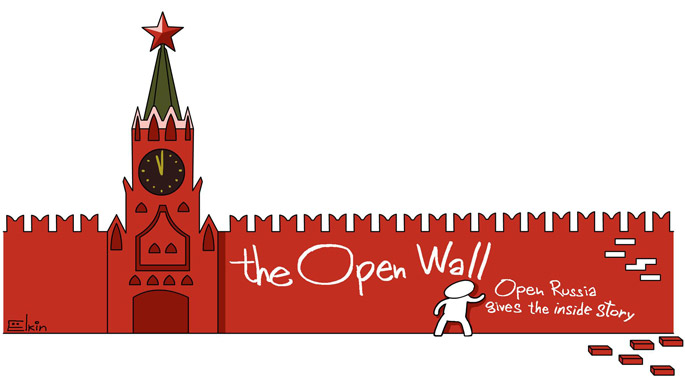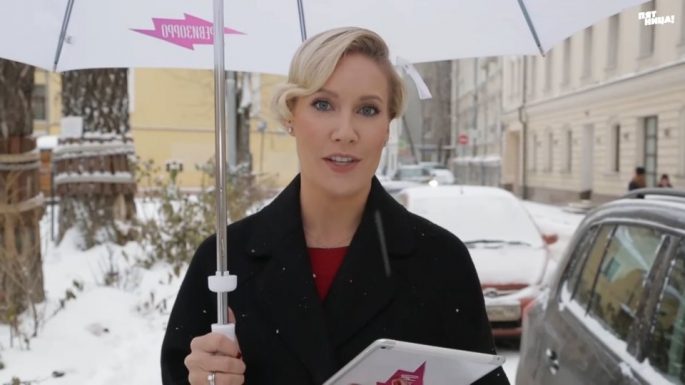The “fridge” incident

The “fridge” incident
It was awkward, not to say ridiculous. Russia’s top hacks have spent the past week scribbling columns about a conflict between a chat show host and a popular café in the centre of Moscow…

Everyone from Oleg Kashin in Republic to Alexander Baunov in Snob delivered their (albeit ironic) conclusions on the “fridge” incident. For the record, TV presenter Elena Letuchaya was apparently locked in a fridge at the Odessa-Mama café, after Letuchaya’s programme Revizorro [Inspectorate] totally slam-dunked the place during a sanitary inspection. Revizorro checks cafés and hotels to find out if they respect consumers’ rights; and the Ukrainian restaurant in downtown Moscow is known as one of the citadels of the Russian intelligentsia.
Forget about the hacking of the Democrats over there, this was a much bigger story over here, with the world and his wife theorising about the relationship between the “creative class” and the “other” Russia, and even using Letuchaya’s programme to draw lessons from the Bolotnaya protests. At some point, the analogies became so strained that the wave of columns was followed by a tsunami of online jokes.
What was it, this convulsion in café society? A storm in a teacup? An optical illusion that caused several thousand Moscow journalists and their friends to confuse their Facebook bubble with the real world, and impose fictitious agendas on each other? Or a precision strike on the Russian intelligentsia’s rawest nerve? The nerve of self-identity.
What is the Russian intelligentsia these days? There is the Vkontakte (Russia’s home-grown Facebook) posse, which journalist Sergei Prostakov and friends have been cultivating for some years now. It fulfils the weighty function of deconstructing and, what’s more, de-monopolising the concept of “intelligentsia.” They post photos not of respected teachers, doctors or librarians, but of ugly mugs carousing in crash pads on the outskirts of Moscow.
This is a new type of intelligentsia made up of provincials and raznochintsy (“common” intellectuals not of noble birth, to use a nineteenth-century term), who have relocated to Moscow to study and work. They have been allowed to enter the Russian intelligentsia through the back door while no one’s looking. But don’t overstay your welcome, there’s a good chap.
Odessa-Mama café is a symbol of this other intelligentsia, which over the past half-century has not only usurped the word, but very deliberately placed itself in direct opposition to the aristocrats, with an equals sign in between – “we” are every bit as good as “you”, it is saying.
Call them the Soviet upper crust, the “nice” faces, the creative class, the pseudo-aristocracy, whatever you like. It is a semi-closed commune, which exists in its own private ghetto even inside the “intelligentsia” community. A dacha at Kratovo; a grandpa who worked at Novy Mir; a job secured by a childhood friend of one’s father. They can be anyone: restaurateurs, writers, artists, photographers, designers. They just have to be universally nice. Universally inside the commune, that is.
The most accurate analogy here would be with the pure-blood families from the world of Harry Potter. Some (despite their condescending attitude) are friends with the mudbloods, but most try to keep them at arm’s length. The scandal at School 57, where “pure-bloods” are educated, was a case in point. Keep Muggles out of our affairs, please.
If one side of the new intellectual nobility consists of service-class people from the security services, the “pure-bloods” are the other side of the proverbial coin: not the intelligentsia per se, but a caricature of it.
The bona fide Russian intelligentsia descended from the aristocracy, but, open and sympathetic to the raznochintsy, espoused the principles of both the nobility and the common citizenry, not only abstract notions of freedom and humanism, but honour, dignity and self-respect. Today, save for a tiny sprinkling of families with dissident roots, the old Muscovite intelligentsia in its current form is genetically spineless. The reverse Darwinism of the Soviet era removed the vertebrae from their backbones. They are servitors who convene at the Kremlin and look kindly upon any kind of government-related work.
All they are able to do is frequent a selection of Moscow cafés and wax drunkenly about how great everything could (and should) be. In the absence of human principles, they substitute worldly philosophy for three or four drinking establishments within the Garden Ring. Why? Because they are not capable of writing War and Peace, Dead Souls or The Nutcracker, or painting The Appearance of Christ Before the People. They don’t even form political circles. Their agenda is simply to knock back a few glasses at Odessa-Mama; hardly the mark of a ghetto, just a run-of-the-mill café on Myasnitskaya Street.
The conflict between the old intelligentsia, which fancies itself as the keeper of a unique brand, and the usurpers, the lumpenintelligentsia, whom the habitués of Children of Paradise, Dom 12 and Odessa-Mama, inwardly grimacing, let sit on fold-away chairs, has been smouldering for some time. Liberals, democrats, creatives, Bolotnaya-ists and the intelligentsia are all bracketed together as a single community (by default, they are said to represent the nomenklatura nobility). But this is not the case: all these words can be roughly divided in twain.
The conflict smoulders and threatens to burst into flames with every new scandal, be it School 57 or Odessa-Mama. The lumpenintelligentsia have so far put up with their secondary role, suffering condescending looks and words, unable as yet to carve out their own semantic identity. And yet they yearn to break free of the brackets. Their next assault will be on the Kremlin.



